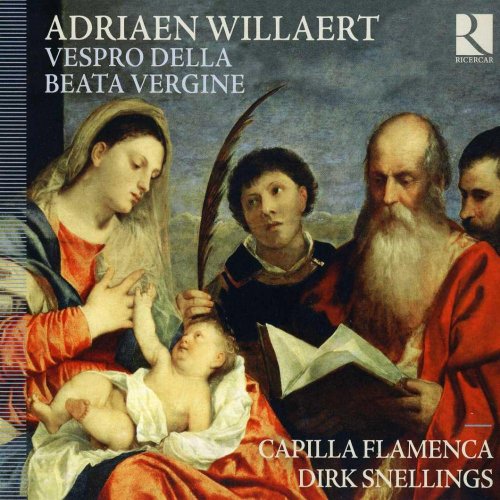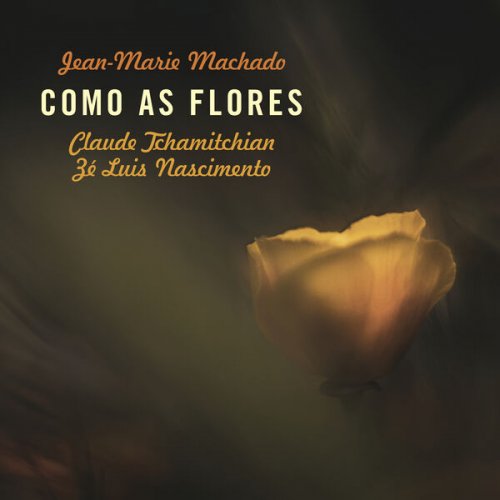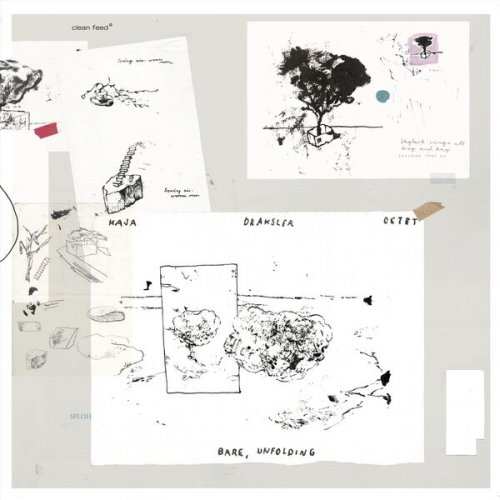Capilla Flamenca & Dirk Snellings - Adriaen Willaert: Vespro della Beata Vergine (2012) CD Rip

Artist: Capilla Flamenca & Dirk Snellings
Title: Adriaen Willaert: Vespro della Beata Vergine
Year Of Release: 2012
Label: Ricercar
Genre: Classical
Quality: FLAC (image + .cue, log, artwork)
Total Time: 01:19:30
Total Size: 327 MB
WebSite: Album Preview
Tracklist:Title: Adriaen Willaert: Vespro della Beata Vergine
Year Of Release: 2012
Label: Ricercar
Genre: Classical
Quality: FLAC (image + .cue, log, artwork)
Total Time: 01:19:30
Total Size: 327 MB
WebSite: Album Preview
01. Deus in adiutorium meum intende Gregorian chant 1’02
02. Toccata del ottavo tono Annibale Padovano 3’48
03. Benedicta es - Per illud ave a 7 Adriaen Willaert 7’05
04. Ricercar I a 4 Adriaen Willaert 4’35
05. Dixit Dominus (ps. 109) a 8 Jachet de Mantua - Adriaen Willaert 6’31
06. Laudate pueri (ps. 112) a 8 Adriaen Willaert 3’54
07. Ricercar primo a 3 Adriaen Willaert 5’18
08. Laetatus sum (ps. 121) a 4 Jachet de Mantua - Adriaen Willaert 6’50
09. Nisi Dominus (ps. 126) a 4 Jachet de Mantua - Adriaen Willaert 5’22
10. Ricercar settimo a 3 Adriaen Willaert 4’12
11. Lauda Jerusalem (ps. 147) a 8 Adriaen Willaert 4’45
12. Ave maris stella a 6 Gregorian chant - Adriaen Willaert 7’42
13. Ricercar X a 4 Adriaen Willaert 5’15
14. Magnificat (aliis temporis) a 4 Gregorian chant - Adriaen Willaert 8’27
15. Benedicamus Domino in laude a 4 Adriaen Willaert - Gregorian 1’34
16. Toccata del terzo e quarto tono (Annibale Padovano) 2’59
Flemish-born composer Adrian Willaert was the most highly regarded composer in Italy of the generation after Josquin Desprez, but even the innovations of the historical-performance movement have largely failed to bring his music to life. It seems either too mechanical, as in the five large antiphonal psalms that make up the heart of this recording, or too fussily dense, as in some of the other choral pieces. One technique that can work is to bring together smaller pieces into the framework of the large occasions for which Willaert often wrote music, and that's what the Capilla Flamenca under Dirk Snellings does here. The Vespro della Beata Vergine (Vespers of the Blessed Virgin) offered here is not a work by Willaert, per se, but it sheds considerable light on his music and how it was used. The Vespers service as a musical event culminated in the great Vespers setting of 1610 by Claudio Monteverdi, but it was large in scale well before that, even if the music of several composers had to be brought together to make it happen. The components here are Willaert's psalms, motets by Willaert from a collection called Musica Nova, chant, introductory and transitional pieces that pick up bits of text, and polyphonic instrumental music by Willaert and Italian composer Annibale Padovano. Some of the psalms, curiously enough, were composed jointly by Willaert and French composer Jachet de Mantua, with one composer taking one chorus and the other the next. This is noted in the booklet, but no speculation is offered as to how this unique arrangement might have come about. At any rate, the overall effect is to generate a large structure with several layers of contrast: between chorus and chorus (which can be done in various ways), between the broad language of the psalms and the denser one of the motets, and between vocal and instrumental music. Heard this way, Willaert does seem a worthy forerunner to Monteverdi (and the dividing line between "Renaissance" and "Baroque" gets even a little shakier). Capilla Flamenca gets the breadth of the music, and Joris Verdin's work on a many-voiced period organ from Bologna (recorded separately from the rest of the album) is very nice. The chorus itself, however, is underpowered with just six voices; some of the polychoral effects in Willaert's music are thought to have depended on the contrast between solo groups and somewhat larger chois, and the application of the one-voice-per-part technique here loses such contrasts. This nevertheless comes closer to "getting" the choral music of Adrian Willaert than do most previous attempts. -- James Manheim








